Every election year, we hear the familiar chant: “Your vote counts!” But is that really the case? Does your singular vote truly hold power, or is it merely a statist ritual to give us an illusion of choice?
A Symbol of Democracy or Illusion of Power?
Voting is often revered as the cornerstone of democracy, a proud act of civic duty. But beneath the veneer of this democratic tenet, a critical question looms, does our vote genuinely shape the political landscape or is it simply a grand charade to make us believe we are in control?
There’s a growing chorus of voices casting doubt on the efficacy of our individual votes. Some argue that voting is not so much an instrument of change but rather a meticulously crafted façade, designed to perpetuate the illusion of control. They contend that while we are marking ballots, significant decisions are being brokered in shadowy corridors, far from the public scrutiny.
As we delve deeper into the labyrinth of the government apparatus, the demarcation between reality and illusion becomes increasingly indistinct. This unsettling uncertainty raises important questions about the role of voting in society.
Deconstructing the Concept of Representation
In theory, the elected officials who represent us in government are expected to express the collective will of the people. However, a close examination of the political landscape reveals that this isn’t always the case. Once ensconced in the corridors of power, politicians frequently shift their focus to appeasing their party lines, pandering to lobbyists, or furthering personal interests. In this scenario, the voice of the individual voter often fades into oblivity.
Complicating matters further, mechanisms like the electoral college and gerrymandering muddy the waters of true representation. These tactics manipulate district boundaries and electoral vote allocation in a way that certain votes carry more weight than others. This essentially turns the concept of “one person, one vote” into a distorted game of political maneuvering where the outcome doesn’t necessarily reflect the will of the people.
In essence, our representatives should be the amplifiers of our collective voices in the government. Yet, it appears that this expectation often clashes with reality, and the concept of representation gets lost in the convoluted world of politics. Therefore, it’s crucial for us to scrutinize and deconstruct this foundational aspect of our statist process. Are our elected officials genuinely representing us? Or is our vote just another gear in the complex machinery of political expediency? These are uncomfortable but necessary questions that demand our attention.
If Voting Mattered, Would They Let You Do It?
This bold query exposes the glossy veneer of the democratic narrative we’re accustomed to hearing. It dares to ask, if our individual votes truly held the potential to upset the entrenched power dynamics, would the system readily permit it? Or is it possible that the act of voting is cleverly designed not to challenge, but rather to endorse the status quo?
Are we simply pawns in a larger political chess game, dutifully casting our votes, unknowingly sanctioning the very power structures we think we’re influencing? The very premise of this question prompts us to take a hard look at the mechanics of our “democratic” process and reassess its underlying power dynamics.
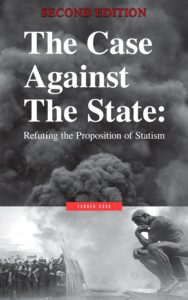
> Check Current Book Prices <
The Statist Ritual: Pacifying the Masses
Have you ever thought of voting as a statist ritual? A practice that, rather than inciting change, serves to uphold the established order? Here, we approach voting from this unique angle. Framed this way, voting is viewed not as an expression of popular will but a rite designed to maintain the calm in the populace.
In this perspective, the act of voting is less about giving the masses control over political destiny and more about placating them, providing a sense of participation in the governance process. The idea of casting a vote, the very act of walking into a voting booth, offers an intoxicating sense of empowerment. It gives the individual a sense of being part of something bigger, a player in the arena of political decision-making.
Yet, it is crucial to question whether this sense of participation truly alters the balance of power, or if it merely mollifies the masses, assuaging any potential discontentment. Is the act of voting designed to genuinely influence political outcomes, or is it more of a safety valve, releasing societal pressure while leaving the fundamental power dynamics untouched?
This perspective is not to belittle the importance of civic participation, but rather to interrogate the true effectiveness of our individual votes. It’s a call to dig deeper, to question whether our act of voting is a genuine tool for change, or if it’s just a ritualized part of the system that quietly preserves the status quo.
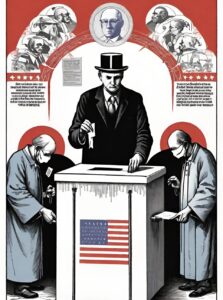
A Closer Look at the Illusion of Electoral Process
Often, we’re lulled into a sense of choice and diversity when election season rolls around, the left vs right political paradigm. Yet, a closer inspection reveals a less democratic reality. Are we genuinely choosing our representatives, or are we merely selecting from a pre-screened lineup presented by dominant political parties and families?
While the election process may appear to offer a myriad of options, the truth may be that the pool of candidates is restricted and curated long before we step into the voting booth. It becomes less about fresh ideas competing in an open marketplace of political discourse, and more about maintaining the hold of established power structures. In this scenario, our supposed republic may in fact resemble an oligarchy, where a select few control the narrative.
It’s essential to question whether the electoral process, as it currently stands, is serving us, the people, or preserving the hegemony of a select few. Our government should not be monopolized, it should reflect the myriad voices and ideas of its constituents. Thus, it’s time to take a more critical look at the electoral process and question whether it truly reflects the values it purports to uphold.
Rethinking Our Delusional Perception of Voting
The time has come for us to re-evaluate our understanding of voting. Is the act of casting a vote really synonymous with wielding power and influence? Or have we been seduced into a skillfully crafted illusion, where we believe we are players on the political stage, but in reality, are just spectators?
It’s time to lift the veil and see government for what it truly should be, a system that honors each voice, a stage where every vote carries weight, and a space where the dynamics of power are genuinely subject to the will of the people. It’s a call to break free from our delusions and question the essence of our political participation. Are we active participants in a political process, or are we mere bystanders in a political spectacle carefully choreographed to maintain the status quo?
These questions may be uncomfortable, but they are necessary if we wish to reclaim the true spirit of individualism and freedom. It’s time to awaken from our delusion and confront the reality of our voting process, for it’s only in understanding the real implications of our vote that we can begin to truly make a difference.




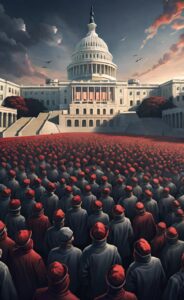
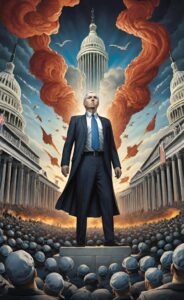
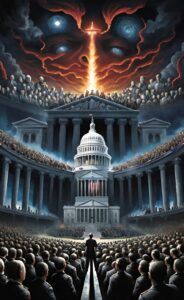
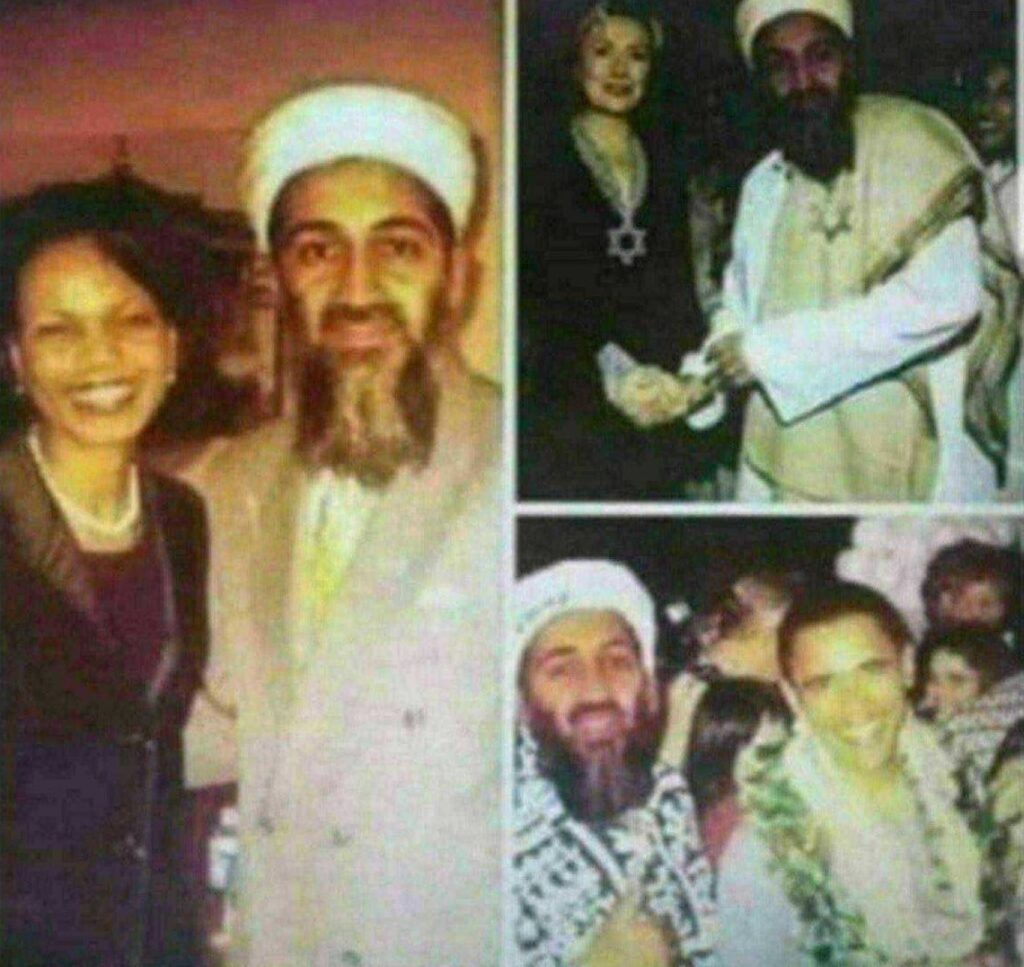
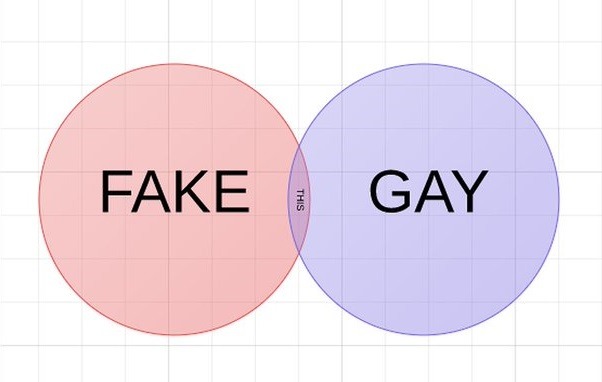
![Russia Invading Ukraine [Emotion War, Psyops, Crisis Actors] Fake Ukraine War](https://nagolbud.com/storage/2021/03/Fake-Ukraine-War.png)